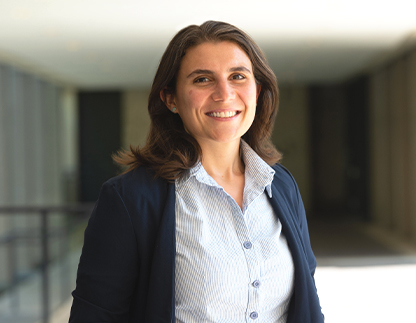Take real time off, spend time with friends and family, explore the city. There is more to life beyond the PhD.”
Pilar Manzi
PhD Candidate in the Department of Political Science

Pilar Manzi is a PhD candidate in the Department of Political Science in the Weinberg College of Arts and Sciences. Her research focuses on the politics of income inequality and redistribution in Latin America. Pilar is a mentor for the Weinberg College of Arts and Sciences International Studies Program’s Global Café, which supports undergraduate students with research, thesis writing, grants, and graduate school preparation.
How would you describe your research and/or work to a non-academic audience?
Very broadly speaking, my research is on how economic inequality translates into political inequality, with a focus on Latin America. I study this from different angles, but my dissertation project focuses on how economic elites understand poverty and inequality, and the implications of that for policymaking.
Tell us what inspired your research and/or work.
During my childhood and teenage years, I moved around several countries with vastly different levels of development. In one country, I could leave my bike on the front lawn without problems; in another, biking was not even an option, not only because of a lack of infrastructure but also because of safety issues. As I grew older, I became more curious about why these differences exist.
What do you find both rewarding and challenging about your research and/or work?
For my dissertation, I had to conduct many interviews with very powerful individuals, often among the richest in a country. As you may imagine, they are very hard to reach. I made countless phone calls, wrote hundreds of follow-up emails, and asked for many favors. It took a lot of persistence and perseverance on my end to finally get all the interviews I needed, which took a year and a half. And, although I would not want to go through that process again, the satisfaction of having achieved these interviews is unparalleled.
How do you unwind after a long day?
For me, exercise is the best way to unwind after a long day. When it’s nice out, I go out for a jog or a walk, though I find it much more enjoyable to play sports—especially soccer. During winter, I try to drag myself to the gym as often as I can by reminding myself how good I feel at the end of a workout.
What books are on your bedside table?
I mostly enjoy historical fiction, especially stories about Latin America. I am currently reading Isle of Passion by Laura Restrepo, which narrates the true story of a group of soldiers sent off to protect a remote island off the coast of Mexico. To be honest, though, there are some intense work weeks where I am too exhausted to continue reading at night, so it can take me a long time to finish a book.
What did you originally want to be when you grew up?
I wanted to be either a detective or a lawyer. To some extent, I think what I do now has some elements of both professions, so I didn’t abandon them totally!
What advice would you give your younger self or someone considering a similar path?
I would tell people to be very sure that they want to pursue this path and understand the sacrifices that it entails. Once you are on this path, take very good care of yourself: take real time off, spend time with friends and family, explore the city. There is more to life beyond the PhD.
Publish Date: March 5, 2024
If you know a graduate student, postdoctoral scholar, graduate faculty member, staff member, or a member of our TGS alumni population who would make a great candidate for our TGS Spotlight Series, please complete this brief TGS Spotlight Series Nomination Form.